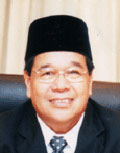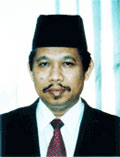|
Malaysian Government Races to Promote Islam Hadhari
 |
|
Dr
Abdullah said "almost every state has launched Islam Hadhari programs
at the state level under the leadership of the chief ministers."
|
By
Adam Mustafa, IOL Correspondent
KUALA
LUMPUR, June 14, 2005 (IslamOnline.net) – The Malaysian government
and its affiliated bodies are championing a major drive to promote
Prime Minister Abdullah Badawi's Islam Hadhari.
"Efforts
to promote Islam Hadhari derive from the highest (federal) office of
the prime minister, who heads the National Council of Islamic
Religious Affairs, which also includes the chief ministers of the
states," Dr Abdullah Mohd Zin, Minister in the Prime Minister's
Department, told IslamOnline.net in a phone interview.
Dr
Abdullah, who also chairs the Department of Islamic Development (Jakim),
added that in every state Jakim officials serve as chairpersons on
committees that have been set up to coordinate programs on Islam
Hadhari.
He
further said that the chief secretary of every ministry is likewise
tasked with promoting Islam Hadhari within his ministry.
Premier
Abdullah maintains that Islam Hadhari, his brainchild, is derived
from the core principles and teachings of Islam.
He
believes the concept has the capacity to generate strength for a
nation because it gave emphasis to various matters including
knowledge, economy, culture, moral values and defense.
"Islam
Hadhari is an effort to bring the Ummah back to basics, back to
the fundamentals, as prescribed in the Qur’an and the Hadith that
form the foundation of Islamic civilization," he had said.
Collective
Action
Dr
Abdullah told IOL that in all almost all states, public education and
awareness programs on Islam Hadhari have been launched.
"Apart
from Sabah and perhaps one or two other states, almost every state has
launched Islam Hadhari programs at the state level under the
leadership of the chief ministers.
"Even
the council of state muftis had on May 6 indicated their support for
Islam Hadhari," he said.
Dr
Abdullah stressed that the government had succeeded at mid-year in
achieving half of the objectives projected for this year's programs.
"I
would say about 50% of our work has already been done at this stage
mid-way through the year," he said.
He
added that the next year's efforts would mostly consist of
streamlining the different projects and initiatives before taking
Islam Hadhari to the next levels of implementation.
Ongoing
Programs
Dr
Abdulllah said that governmental institutions as well as ministries
have already initiated policies and programs the underlying values of
which are in line, if not derived from, Islam Hadhari.
"The
Ministry of Art, Culture and Heritage some time ago launched the Budi
Bahasa (polite manners and speech) campaign. That was derived from
Islam Hadhari principles," he said.
"The
same thing goes for some programs in education, such as the national
schools' 'J-Qaf program' whereby elementary schoolchildren need not go
for exta classes to learn Arabic script, Qur'an, and basic religious
obligations (but can learn these in school)," the official said
added.
Another
example of Islam Hadhari in action is programs by the youth and sports
ministry, which addressed the incidence of youth involved in social
problems and ills, Dr Abdullah said.
"In
this way, we combine the goals of the youth and sports ministry
together with the aims of Islam Hadhari, which is to prevent more
social problems."
The
agriculture ministry, meanwhile, is receiving increased attention in
contrast to the previous economic focus on manufacturing and the
electronics industry.
"The
government is increasingly stressing on the role of agriculture. This
is also in line with the Islam Hadhari principle of 'balanced
development', as we had previously concentrated on the manufacturing
sectors, factories, and infra-structure.
"Now
we are turning more and more to the agricultural sectors of palm oil,
rubber, and rice production."
Non-Muslims
Involved
 |
|
Mustafa said the Institute of Islamic Understanding is discussing Islam Hadhari with non-Muslims as well.
|
Mustafa
Abdul Rahman, Jakim's director-general, said that non-Muslims would
not be left out of the programs.
The
Institute of Islamic Understanding is tasked with informing and
discussing with them the implications of Islam Hadhari, he told IOL.
"Islam
can not be merely for Muslims who accepted its message. Islam is a
mercy unto all mankind, Muslims as well as non-Muslims. The benefits
thus apply to non-Muslims as well as Muslims," said the official.
The
Islamic Da'wah Foundation will meet with the non-governmental
organisations, the armed forces' Islamic religious corp Kagat will be
tasked with explaining Islam Hadhari to military rank and file, while
the Ministry of Higher Education will address university lecturers and
students, said Mustafa.
He
stressed that Jakim has printed and distributed more than 200,000
copies of a book on Islam Hadhari in the Malay language, its
director-general Mustafa Abdul Rahman told IOL.
"This
will be followed by 500,000 very soon. They have already been printed.
They are just waiting to be distributed," he added.
Mustafa
said they are preparing English, Tamil, Mandarin, and Arabic
translations of the book to be distributed worldwide.
Problems
of Perception
As
de facto minister of religious affairs, Dr Abdullah admitted that the
promotion of Islam Hadhari is not problem-free.
He
acknowledged that, on the local front, there has been considerable
skepticism and cynicism, if not outright objections, with the
premier's attempt to spur both human and physical development through
the promotion of a 'civilizational Islam'.
These
range from criticisms of its lack of clarity to skepticism as to its
ability to affect significant change.
"The
main problem we've faced in presenting Islam Hadhari is the cloudiness
with which the idea is regarded," said Dr Abdullah.
"But
what we are doing is nothing new. It is merely a new approach to spur
on the physical and human development of the country. It is merely a
comprehensive and contemporary set of principles based on the Qur'an
and Hadith".
As
to claims that there is 'only one Islam' and that the government was
differentiating the strands, implying thereby that there was a
'primitive' Islam as opposed to a 'modern' or civilized one, Abdullah
said the very problem of perception had indeed stunted the ability of
Islam and Muslims to develop.
"Previously,
social Islamic obligations, education, politics, these things were not
stressed by Muslims in Malaysia. We have to move away from such a
parochial narrow vision of Islam to one that is balanced and
comprehensive," he said.
This
was also the reason, said Dr Abdullah, that 'Islam' had to be
presented as a contemporary dynamic force instead of merely coining
the term Muslim Hadhari.
"Everybody
is strongly encouraged to take part in efforts to realize Islam
Hadhari. You have some Islamic traditions that are geared to specific
concerns, such as Islamic politics, Islamic spirituality, or Islamic
rituals. With Islam Hadhari, we're trying to build a civilizational
Islam, which encompasses many things," he said.
|